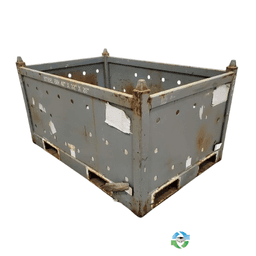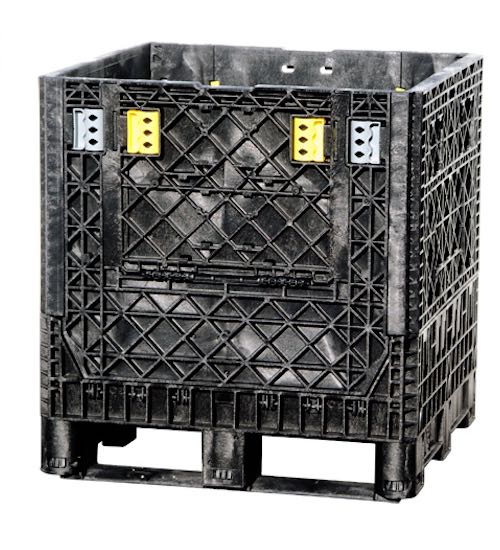A complete guide to used collapsible bulk containers for easy transport and storage
The Ultimate Overview to Picking the Right Mass Containers for Your Service Requirements
Picking the proper mass containers is vital for any service that counts on reliable logistics. Different sorts of containers exist, each designed for particular materials and applications. Aspects such as size, material compatibility, and regulatory criteria play a significant role in this decision-making procedure. Understanding these components can cause improved functional performance. Numerous businesses forget essential facets that could improve their general efficiency and sustainability. What are these factors to consider?
Understanding Different Kinds of Bulk Containers
Mass containers act as vital devices for companies looking for effective storage and transport options. These containers can be found in various types, each made to fulfill particular operational requirements. One usual type is the intermediate bulk container (IBC), which is excellent for granulated and fluid materials, using a balance of capacity and maneuverability. One more prominent choice is the mass bag, or FIBC, ideal for completely dry, flowable items. These versatile containers are light-weight and can be quickly transferred and stored. For larger materials, stiff mass containers are commonly used, providing sturdiness and security for safe handling. Furthermore, there are specific containers customized for dangerous materials, making sure compliance with safety guidelines. Understanding the unique characteristics of these bulk container types allows organizations to make educated choices that optimize logistics and reduce costs. By selecting the best container, business can enhance their functional effectiveness and streamline their supply chain processes.
Trick Material Factors To Consider for Mass Containers
When selecting bulk containers, it is vital to contemplate the materials utilized in their construction. Aspects such as stamina, chemical, and toughness compatibility play a critical duty in making certain the containers meet specific functional needs. In addition, weight and portability problems can affect both effectiveness and transport logistics.
Material Toughness and Stamina
Durability and strength are critical consider picking materials for mass containers, as they directly influence the container's capability to endure numerous environmental problems and taking care of processes. Materials such as high-density polyethylene (HDPE), polypropylene, and stainless-steel are frequently favored for their robust buildings, offering resistance to effect, abrasion, and temperature changes. The selection of product likewise influences the total life expectancy of the container; stronger materials commonly result in much less constant substitutes, bring about set you back savings with time. In addition, the weight of the material can affect delivery prices and simplicity of handling. Organizations need to consider their specific operational atmospheres and the capacity for deterioration to ensure peak sturdiness and strength in their bulk container option.
Chemical Compatibility Aspects
Understanding chemical compatibility is vital for picking bulk containers, as the materials used need to withstand the details substances they will hold. Numerous aspects affect compatibility, including the chemical nature of the contents, temperature level, and period of storage. Harsh chemicals might need containers made from stainless steel or specialized plastics that withstand destruction. Furthermore, reactive substances can produce heat or gases, demanding vented or pressure-rated containers. The choice of container product, whether polycarbonate, polyethylene, or steel, should line up with the chemical buildings of the kept materials to protect against violations or leakages. Ultimately, an extensive analysis of these compatibility factors guarantees secure handling and storage, shielding both workers and the atmosphere while preserving product honesty.
Weight and Portability Issues
Choosing mass containers entails not just evaluating chemical compatibility but additionally considering weight and mobility. Organizations need to examine the ease of handling and transportation to enhance effectiveness. Lightweight products like high-density polyethylene (HDPE) or aluminum can promote simpler movement and decrease shipping costs. On the other hand, heavier containers might provide boosted sturdiness however can hinder mobility, especially in environments needing constant moving. Additionally, the style of the container must enable convenient training and stacking, ensuring ergonomic safety and security for employees. Companies should also take into consideration the framework offered for transportation; as an example, containers compatible with forklifts or pallet jacks can streamline procedures. Eventually, the appropriate balance between weight and mobility straight affects functional effectiveness and price effectiveness.
Sizing Your Mass Containers for Ideal Effectiveness
When sizing bulk containers, businesses should very carefully examine the dimensions required to fit their specific items. In addition, weight capacity is a vital factor that influences effectiveness and security during transportation and storage space. Effective sizing not only optimizes go to this site area however also enhances operational process.
Determining Container Capacities
Choosing the best measurements for bulk containers is crucial for making best use of performance in storage space and transport. Organizations have to assess their certain requirements, thinking about factors such as available space, the nature of the items being saved, and the methods of transportation utilized. Precise measurements guarantee that containers fit preferably in cars and stockrooms, lessening squandered area and lowering managing time. Criterion dimensions can supply ease, however custom measurements may be essential for unique demands or to accommodate certain items. In addition, it is important to examine stacking capabilities and availability, as these aspects influence overall operational performance. Inevitably, the appropriate measurements lead to enhanced organization and structured logistics, benefiting the general performance of business.
Weight Ability Considerations
Recognizing weight capability is essential for organizations aiming to enhance their bulk container performance. The weight ability of a container directly impacts storage capacities, transport logistics, and general operational expenses. Picking containers with the suitable weight restrictions guarantees that businesses can securely save and carry their items without running the risk of damages or compliance issues. Straining containers can bring about architectural failures, while underutilizing capability results in thrown away sources. When choosing containers, it is essential for services to examine their product weights and think about any regulatory requirements. In addition, variables such as the kind of material, intended usage, and ecological problems must additionally affect weight capacity decisions. By reviewing these elements, services can improve performance and ensure a structured supply chain.
Regulatory Conformity and Safety And Security Standards

Regulative conformity and safety standards play a crucial role in the option of bulk containers for companies. Organizations needs to ensure that their containers satisfy various laws set by neighborhood, nationwide, and global authorities. These standards commonly refer to material safety and security, structural integrity, and correct labeling, which help protect against mishaps and assure the secure transportation of items.
In addition, adherence to industry-specific standards, such as those from the Fda (FDA) or the Occupational Security and Health And Wellness Administration (OSHA), is critical for firms managing unsafe products or food. Non-compliance can result in fines, legal problems, or damage to an organization's track record.
Organizations ought to also think about the container's compatibility with the products being stored or carried to avoid contamination or chemical responses (refurbished bulk containers). To summarize, recognizing and implementing regulatory compliance and security requirements is necessary for the efficient and responsible use mass containers
Sustainability Options for Eco-Friendly Bulk Containers

Firms are also discovering alternatives made from recycled materials, which not only save sources yet additionally sustain the reusing sector. Furthermore, developments in layout enable lighter containers that call for much less power to transportation, further enhancing sustainability. By integrating these eco-friendly bulk container alternatives, companies can show their dedication to ecological stewardship while fulfilling customer need for lasting methods. This shift not just helps the planet yet can likewise improve brand reputation and customer commitment.
Cost-Effectiveness and Budgeting for Mass Containers
While lots of businesses focus on sustainability, cost-effectiveness continues to be a critical variable when picking mass containers. Organizations has to analyze the first purchase cost, in addition to lasting operational prices, to guarantee monetary stability. Elements such as resilience, upkeep, and reusability play a considerable role in identifying general expenses.
Spending in high-grade containers may produce higher ahead of time expenses yet can bring about financial savings via minimized replacement rates and decreased waste. In addition, services must think about transport costs and storage space performance, as these can impact the overall budget.

Regularly Asked Questions
Just how Do I Figure Out the Right Container for Hazardous Materials?
To identify the best container for unsafe materials, one must review compatibility with the substance, think about the container's product, look for governing conformity, and evaluate ability and security attributes to assure appropriate handling and storage.
Can Bulk Containers Be Customized for Certain Products?
Yes, bulk containers can be customized for details items. refurbished bulk containers. Different attributes, such as size, material, and layout, can be customized to satisfy distinct requirements, ensuring perfect security and efficiency for moving and storing various goods
What Is the Typical Life-span of Various Mass Container Kind?
The typical life expectancy of bulk container kinds differs; plastic containers last 5-10 years, steel containers 10-20 years, and wooden containers commonly last 3-7 years, depending on usage, maintenance, and ecological problems.
Exactly how Should I Tidy and Maintain Bulk Containers?
To clean and keep bulk containers, one need to regularly inspect for damage, remove deposit, wash with ideal detergents, rinse thoroughly, and assurance appropriate drying out before storage space. Following maker guidelines enhances longevity and security during usage.
Are There Rental Choices for Mass Containers Available?
Yes, numerous business supply rental choices for bulk containers, supplying versatility for companies. These rentals can suit numerous needs, allowing business to handle stock efficiently without the commitment of acquiring containers outright.
Durability and strength are essential variables in selecting products for bulk containers, as they directly influence the container's capacity to stand up to various environmental conditions and handling procedures. Comprehending chemical compatibility is necessary for choosing mass containers, as the materials made use of need to withstand the details substances they will hold. Comprehending weight ability is important for services aiming to enhance their bulk container efficiency. Governing conformity and security requirements play a vital role in the choice of mass containers for services. While several organizations concentrate on sustainability, cost-effectiveness stays a critical element when selecting bulk containers.